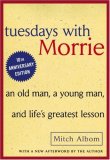Summary | Excerpt | Reading Guide | Reviews | Readalikes | Genres & Themes | Author Bio

An Old Man, A Young Man & The Last Great Lesson
by Mitch AlbomChapter One
The Curriculum
The last class of my old professor's life took place once a week in his house, by a window in the study where he could watch a small hibiscus plant shed its pink leaves. The class met on Tuesdays. It began after breakfast. The subject was The Meaning of Life. It was taught from experience.
No grades were given, but there were oral exams each week. You were expected to respond to questions, and you were expected to pose questions of your own. You were also required to perform physical tasks now and then, such as lifting the professor's head to a comfortable spot on the pillow or placing his glasses on the bridge of his nose. Kissing him good-bye earned you extra credit.
No books were required, yet many topics were covered, including love, work, community, family, aging, forgiveness, and, finally, death. The last lecture was brief, only a few words.
A funeral was held in lieu of graduation.
Although no final exam was given, you were expected to produce one long paper on what was learned. That paper is presented here.
The last class of my old professor's life had only one student.
I was the student.
It is the late spring of 1979, a hot, sticky Saturday afternoon. Hundreds of us sit together, side by side, in rows of wooden folding chairs on the main campus lawn. We wear blue nylon robes. We listen impatiently to long speeches. When the ceremony is over, we throw our caps in the air, and we are officially graduated from college, the senior class of Brandeis University in the city of Waltham, Massachusetts. For many of us, the curtain has just come down on childhood.
Afterward, I find Morrie Schwartz, my favorite professor, and introduce him to my parents. He is a small man who takes small steps, as if a strong wind could, at any time, whisk him up into the clouds. In his graduation day robe, he looks like a cross between a biblical prophet and a Christmas elf. He has sparkling blue-green eyes, thinning silver hair that spills onto his forehead, big ears, a triangular nose, and tufts of graying eyebrows. Although his teeth are crooked and his lower ones are slanted back--as if someone had once punched them in--when he smiles it's as if you'd just told him the first joke on earth.
He tells my parents how I took every class he taught. He tells them, "You have a special boy here." Embarrassed, I look at my feet. Before we leave, I hand my professor a present, a tan briefcase with his initials on the front. I bought this the day before at a shopping mall. I didn't want to forget him. Maybe I didn't want him to forget me.
"Mitch, you are one of the good ones," he says, admiring the briefcase. Then he hugs me. I feel his thin arms around my back. I am taller than he is, and when he holds me, I feel awkward, older, as if I were the parent and he were the child.
He asks if I will stay in touch, and without hesitation I say, "Of course."
When he steps back, I see that he is crying.
CHAPTER TWO
The Syllabus
His death sentence came in the summer of 1994. Looking back, Morrie knew something bad was coming long before that. He knew it the day he gave up dancing.
He had always been a dancer, my old professor. The music didn't matter. Rock and roll, big band, the blues. He loved them all. He would close his eyes and with a blissful smile begin to move to his own sense of rhythm. It wasn't always pretty. But then, he didn't worry about a partner. Morrie danced by himself.
He used to go to this church in Harvard Square every Wednesday night for something called "Dance Free." They had flashing lights and booming speakers and Morrie would wander in among the mostly student crowd, wearing a white T-shirt and black sweatpants and a towel around his neck, and whatever music was playing, that's the music to which he danced. He'd do the lindy to Jimi Hendrix. He twisted and twirled, he waved his arms like a conductor on amphetamines, until sweat was dripping down the middle of his back. No one there knew he was a prominent doctor of sociology, with years of experience as a college professor and several well-respected books. They just thought he was some old nut.
Excerpted from Tuesdays With Morrie : An Old Man, a Young Man, and the Last Great Lesson by Mitch Albom. Copyright © 1997 by Mitch Albom. Excerpted by permission of Doubleday, a division of the Bantam Doubleday Dell Publishing Group, Inc. All rights reserved. No part of this excerpt may be reproduced or reprinted without permission in writing from the publisher.
Life is the garment we continually alter, but which never seems to fit.
Click Here to find out who said this, as well as discovering other famous literary quotes!
Your guide toexceptional books
BookBrowse seeks out and recommends the best in contemporary fiction and nonfiction—books that not only engage and entertain but also deepen our understanding of ourselves and the world around us.